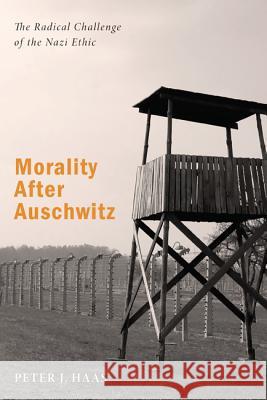Morality After Auschwitz: The Radical Challenge of the Nazi Ethic » książka
Morality After Auschwitz: The Radical Challenge of the Nazi Ethic
ISBN-13: 9781625645739 / Angielski / Miękka / 2014 / 270 str.
Endorsements: "This book is a study of the Holocaust as problem in ethical theory. How could a whole society participate in an ethic of mass torture and genocide for over a decade without opposition from responsible political, legal, medical, or religious leaders? How does a society create and adopt its ethical norms? This is a study in narrative ethics at its best, yet the author's purpose is to discover how a people redefined evil to the degree that they committed heinous atrocities that were reprehensible under normal circumstances." --Guy Greenfield, Southwestern Journal of Theology "Peter Haas gives us a good overall description of the Holocaust, the way the Nazis and their myriad collaborators treated the Jews. The book . . . is well formulated and well written. It makes a good one-volume introduction to the Holocaust." --Frederick K. Wentz, Lutheran Quarterly "Peter Haas urges us to recognize ourselves in the perpetrators of the Holocaust. . . . In the course of setting forth his position, the author offers a concise and wonderfully accessible account of the formation of German political culture from Bismarck through Hitler. . . . Morality After Auschwitz is a serious book that should provoke long thoughts, and perhaps useful disputes, about the power of ethics to shape political cultures." --First Things
Endorsements:"This book is a study of the Holocaust as problem in ethical theory. How could a whole society participate in an ethic of mass torture and genocide for over a decade without opposition from responsible political, legal, medical, or religious leaders? How does a society create and adopt its ethical norms? This is a study in narrative ethics at its best, yet the authors purpose is to discover how a people redefined evil to the degree that they committed heinous atrocities that were reprehensible under normal circumstances."--Guy Greenfield, Southwestern Journal of Theology"Peter Haas gives us a good overall description of the Holocaust, the way the Nazis and their myriad collaborators treated the Jews. The book . . . is well formulated and well written. It makes a good one-volume introduction to the Holocaust."--Frederick K. Wentz, Lutheran Quarterly"Peter Haas urges us to recognize ourselves in the perpetrators of the Holocaust. . . . In the course of setting forth his position, the author offers a concise and wonderfully accessible account of the formation of German political culture from Bismarck through Hitler. . . . Morality After Auschwitz is a serious book that should provoke long thoughts, and perhaps useful disputes, about the power of ethics to shape political cultures."--First Things











